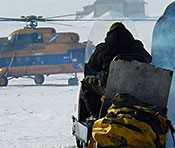At a time of rapidly deteriorating relations between Russia and America, U.S. scientist Joel Berger continues his work with his Russian counterparts
on Siberia’s Wrangel Island. In the third of three blog posts for Yale Environment 360, Berger — a biologist with the Wildlife Conservation Society and the University of Montana — writes about efforts to better understand how rapid climate change might affect muskoxen and other wildlife in the Russian and North American Arctic. As Berger explains, a key focus of Russian-American scientific cooperation is Beringia, the region of northwestern Alaska and extreme northeastern Russia where two countries — and continents — are divided by the Bering Sea.
Read more.
Read more.

